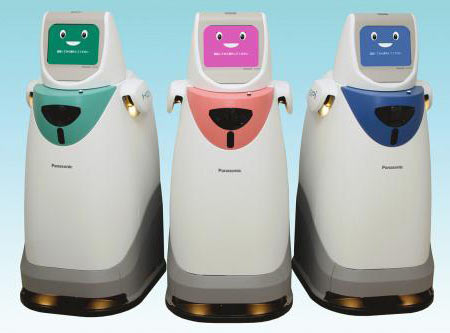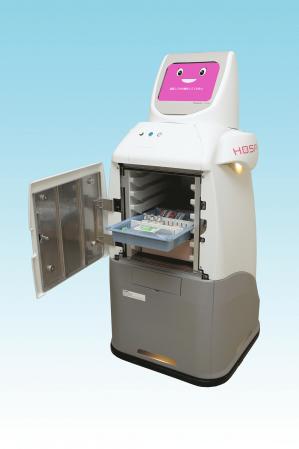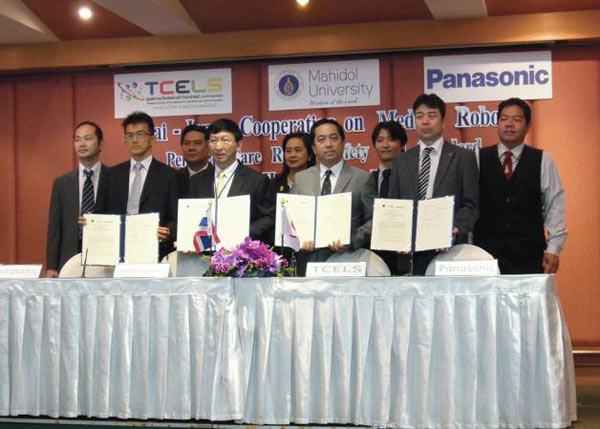
This video presents Panasonic Solutions Report 04 “Health Care Solution”.
“Health care providers around the world are looking for ways to alleviate the workloads of nursing staff stretched to the limits. Can robot automation help improve quality of nursing and raise expectations for a viable solution? A hospital in Osaka, Japan is doing just that. It is testing “HOSPI”―an autonomous delivery robot for hospitals―which provides new solutions for health care. Business journalist Mike Firn reports from the scene.“
Solution Report of HOSPI

PRESS RELEASE
Panasonic Joins Thai Project, “Center for Advanced Medical Robotics”
Mar 09, 2015
Bangkok, Thailand – Panasonic’s New Business Promotion Project of Global Manufacturing Division and Analysis Center have recently joined the national robotics project “Center for Advanced Medical Robotics” in Thailand. On February 6, 2015, a signing ceremony and media event was held in Bangkok, Thailand with Yoshiyasu Honma, Project Leader of the New Business Promotion Project; Yoshihiko Namba, Director of Analysis Center; and three other members participating.

For the purpose of developing and demonstrating medical robots in Thailand, the Center for Advanced Medical Robotics, under the leadership of the Thailand Centre of Excellence for Life Sciences (TCELS)*1 and Mahidol University*2, has been funded for a five year period from 2013 to 2017 with 2 billion baht (approximately 7 billion Japanese yen).
From Panasonic, the New Business Promotion Project of Global Manufacturing Division and Analysis Center will participate in this project in such areas as Standardization and Authentication Support, Safe Design Consulting, and Demonstration of Robots. They will contribute to the advance of medical robot technology in Thailand by using the knowledge they have acquired through development and commercialization of robotic technologies represented by an autonomous delivery robot system “HOSPI” and an integrated care bed/wheelchair “RESYONE”.
At the signing ceremony held on February 6, a memorandum of understanding (MOU) was signed by Dr. Nares Damrongchai, CEO of TCELS; Clinical Professor Udom Kachintorn, President of Mahidol University; and Project Leader Mr. Honma and Director Dr. Namba from Panasonic. Subsequently, a media event was held with a number of Thai media outlets.
Background on Involvement
Panasonic was involved in the development of ISO13482, an international safety standards for personal care robots, and the detailed Japanese Industrial Standards (JIS) based on ISO13482. With these experiences, the Project will support formulation of Thai national safety standards, with a view to jointly submitting them to the International Organization for Standardization (ISO) in the future.
Further, by taking advantage of Panasonic’s experience in developing and demonstrating robots, the Project can conduct pre-demonstration using Panasonic’s robots and assist with demonstration of robots developed in Thailand. Specifically, expertise will be drawn from the arrangements and improvements made to Panasonic’s robot system ‘HOSPI” at the Matsushita Memorial Hospital in Osaka Japan especially during the introduction phase, know-how for effectively introducing robots to the work field, and also means to confirm the effectiveness of robots through demonstration.
Furthermore, Panasonic will also provide technical assistance in testing and authenticating robots. For example, they will support development of safe design for robots being used in Thailand and the start-up of a robot verification center. In this initiative, Panasonic will utilize various test methods, analysis techniques, and know-how for product risk assessment, which have been developed within Panasonic Group.
In the future, Panasonic will continue to work together to promote assistance in robot development in Thailand, and at the same time, through participation in this project, Panasonic aims to expand its robot business in ASEAN countries situated around Thailand. Further, they will promote partnerships with ASEAN countries on development of various standards, with the aim of making the standards used in Asia and in Japan, global standards.
*1 The Thailand Centre of Excellence for Life Sciences (TCELS): an organization established by the Royal Thai Government that promotes technology development with a focus on life sciences. Under the supervision of the Ministry of Science and Technology, it promotes national projects and encourages investment in universities, research institutions, and private enterprises. *2 Mahidol University: one of top universities in Thailand, where the engineering faculty is closely linked to the medical faculty and consequently, has many activities related to medical science. The Faculty of Engineering Biomedical Engineering Laboratories is doing research and development related to medical robots.
Related Links:
- Enriching Services in Healthcare through Panasonic HOSPI Robot
- Panasonic and Matsushita Memorial Hospital Receive Robot Award
- Panasonic Starts Testing of Head Care Robot
——————————————————–
You may also want to know:
- You’re Invited: Makerbot Retail Store’s Innovator Sessions – Isaac Budmen in New York City March 19, 2015 (FREE Admission)
- Panasonic Mirrorless Camera Week March 23-28, 2015 California: Daily Prizes, Mirrorless Camera Walk at No Charge, Try Out Gear & Learn from the Pros (FREE Mirrorless Camera Walk with a Pro)
- Please Help Create the World’s Largest Marine Sanctuary in the Pacific: Petition Before Aug.11, 2014
- McAfee: Superstar Soccer Players’ Screensavers and “Skills” Video Downloads are Risky to Search for Online (McAfee’s FREE SiteAdvisor)
- You’re Invited: “Toronto Observed Through Three Generations: Photographs by Harry Joy, Doug Hemmy and Andy Brooks” Jan.24-May 9, 2015 (Opening Reception Jan.24; FREE Admissions, Toronto)
- Finalists of 2015 Scotiabank Photography Award, the Most Prestigious Award in Canadian Contemporary Photography + You’re Invited to Mark Ruwedel Exhibition Apr.29-Jun.28, 2015 (FREE Admission, Toronto)
- “Benoit Aquin: Mégantic in Pictures”: A Contemporary Photography Exhibition in Montreal February 18 – May 24, 2015 (FREE Admission for ages 12 and under, and VIP members)
- You’re Invited to Doors Open Toronto: Celebration of Toronto Buildings May 23 & 24, 2015 (FREE Admissions)
- “Eyes Wide Open! 100 Years of Leica Photography”: The Anniversary Exhibition in The Fotografie Forum Frankfurt 13 March – 31 May, 2015 (Germany; FREE Admission for children aged under 12 and members; Reduced admission for students, apprentices, unemployed persons, severely handicapped persons)
- You’re Invited: Camera Obscura at The Photographers’ Gallery (FREE admission in London, UK)
- Panasonic + UNESCO: Beautiful 2015 World Heritage Calendar App for PCs & Tablets in Five Languages (FREE App)
- Stratasys’ New Recycling Program of 3D Printing Material Canisters & Cartridges for North American Customers Starts Today: Waste Disposal at No Charge (FREE disposal & recycling program)
- Photography Copyright Kit (FREE)
- Nikon Canada Invites Canadian Residents to Nikon Image Space: An Online Service for Sharing Photos or Recording Memories (FREE online service for all Canadian residents to share & record images: FREE two GB of storage for everyone and Nikon camera owners get an extra FREE 18 GB of storage.)
- New NIKON IMAGE SPACE App Renewal at No Charge: Benefits Include Seeing Images Larger & Browsing Images Stored on Your Smart Device (FREE online photo sharing service + FREE renewal of smart device app for “NIKON IMAGE SPACE”)
- Canon’s Cloud-based Image Management Service, irista: No Cost for Up to 15GB + New Updates are Now Live (FREE 15GB of cloud storage space with full irista functionality)
- You’re Invited to the New Leica Fotopark: A Photo Platform for Passionate Photographers to Discover, Exchange, Organise, Create [Registration on www.leica-fotopark is FREE, as is the use of the platform for data volumes of up to ten gigabytes (GB)]
- You’re Invited: Download Leica Fotografie International App for iPhone, iPod Touch, iPad and Android
- Scarborough Subway Project Assessment-Line 2 Extension: Public Consultations Jan.31 & Feb.2, 2015 + Online Feedback
- Celebrate: Fort York Visitor Centre (five new exhibitions is opened inside the new Visitor Centre in 2014 – 2015)
